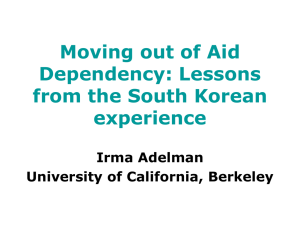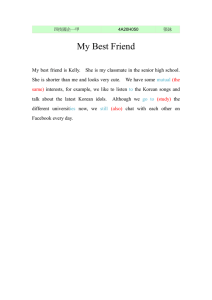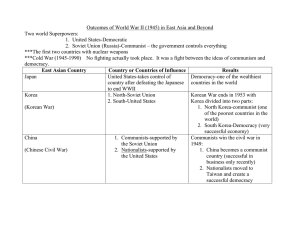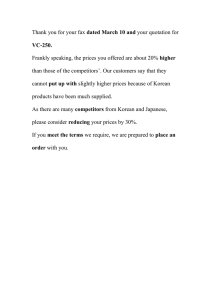THE PROGRAM of the 14th Central and East European Society of
advertisement
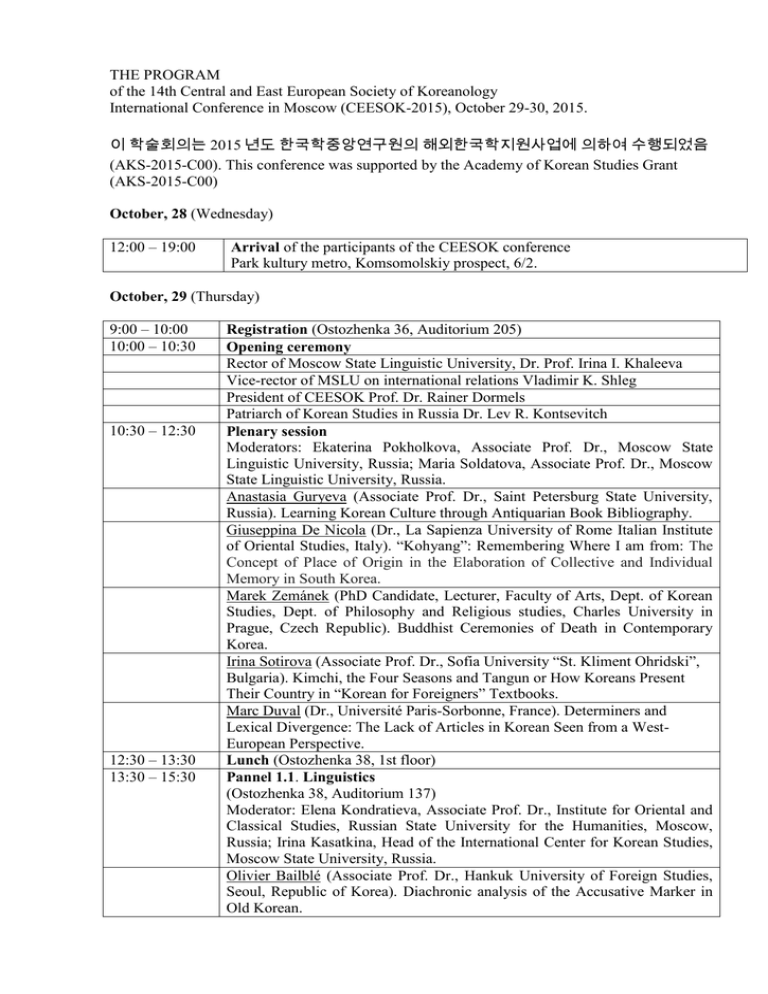
THE PROGRAM of the 14th Central and East European Society of Koreanology International Conference in Moscow (CEESOK-2015), October 29-30, 2015. 이 학술회의는 2015 년도 한국학중앙연구원의 해외한국학지원사업에 의하여 수행되었음 (AKS-2015-C00). This conference was supported by the Academy of Korean Studies Grant (AKS-2015-C00) October, 28 (Wednesday) 12:00 – 19:00 Arrival of the participants of the CEESOK conference Park kultury metro, Komsomolskiy prospect, 6/2. October, 29 (Thursday) 9:00 – 10:00 10:00 – 10:30 10:30 – 12:30 12:30 – 13:30 13:30 – 15:30 Registration (Ostozhenka 36, Auditorium 205) Opening ceremony Rector of Moscow State Linguistic University, Dr. Prof. Irina I. Khaleeva Vice-rector of MSLU on international relations Vladimir K. Shleg President of CEESOK Prof. Dr. Rainer Dormels Patriarch of Korean Studies in Russia Dr. Lev R. Kontsevitch Plenary session Moderators: Ekaterina Pokholkova, Associate Prof. Dr., Moscow State Linguistic University, Russia; Maria Soldatova, Associate Prof. Dr., Moscow State Linguistic University, Russia. Anastasia Guryeva (Associate Prof. Dr., Saint Petersburg State University, Russia). Learning Korean Culture through Antiquarian Book Bibliography. Giuseppina De Nicola (Dr., La Sapienza University of Rome Italian Institute of Oriental Studies, Italy). “Kohyang”: Remembering Where I am from: The Concept of Place of Origin in the Elaboration of Collective and Individual Memory in South Korea. Marek Zemánek (PhD Candidate, Lecturer, Faculty of Arts, Dept. of Korean Studies, Dept. of Philosophy and Religious studies, Charles University in Prague, Czech Republic). Buddhist Ceremonies of Death in Contemporary Korea. Irina Sotirova (Associate Prof. Dr., Sofia University “St. Kliment Ohridski”, Bulgaria). Kimchi, the Four Seasons and Tangun or How Koreans Present Their Country in “Korean for Foreigners” Textbooks. Marc Duval (Dr., Université Paris-Sorbonne, France). Determiners and Lexical Divergence: The Lack of Articles in Korean Seen from a WestEuropean Perspective. Lunch (Ostozhenka 38, 1st floor) Pannel 1.1. Linguistics (Ostozhenka 38, Auditorium 137) Moderator: Elena Kondratieva, Associate Prof. Dr., Institute for Oriental and Classical Studies, Russian State University for the Humanities, Moscow, Russia; Irina Kasatkina, Head of the International Center for Korean Studies, Moscow State University, Russia. Olivier Bailblé (Associate Prof. Dr., Hankuk University of Foreign Studies, Seoul, Republic of Korea). Diachronic analysis of the Accusative Marker in Old Korean. Pawel Kida (Senior lecturer, PhD, Adam Mickiewicz University, Poznań, Poland). Determiners in Korean Language? Yaroslava Pakulova (Senior lecturer, Department of Japanese, Korean and 13:30 – 15:30 15:30 – 16:00 16:00 – 18:00 Other Languages; MGIMO University, Moscow, Russia). Using -(으)니까 in Non-Imperative/ Non-Propositive Sentences. Elena Rudnitskaya (Senior researcher, Dr., Institute of Oriental Studies, Department of the Asian and African peoples’ languages, Russian Academy of Science, Moscow, Russia), Hwang Seo-Kyoung (Dr., Department of Russian Language and Literature, Yonsei University, Republic of Korea). Analytic / Serial Verb Constructions in Korean in Light of Serial Verb Constructions in Turkic Languages. Vera Anikina (Associate Prof. Dr., National Research University “Higher School of Economics”, Head of Korean Major School of Asian Studies Faculty of World Economy and International Affairs, Moscow, Russia). Discourse Approach to New Year Speeches of the Presidents of the ROK). Spas Rangelov* (Lecturer, Dr. from SOAS, University of London, Ss Cyril and Methodius University in Skopje, Macedonia). Differences of Gra mmatical Categories of Nouns and Noun Phrases in Korean and Bulgarian: Po tential Implications for Applied Linguistics. Pannel 1.2. Political, Economical and Social Issues (Ostozhenka 38, Auditorium 138) Moderator: Aleksander Zhebin, Dr., Director of the Center for Korean Studies, Institute of Far Eastern Studies, Russian Academy of Science, Moscow, Russia. Rainer Dormels (Univ.-Prof. Dr., University of Vienna, Austria). An Analysis on the Industrial Potential and Urban Growth of the Cities of the Phyǒngnam Province. Soyoung Kim, Yanitsa Ivanova (Prof. Dr., Sofia University “St. Kliment Ohridski”, Bulgaria). A Study on Bulgaria’s Medical Support for North Korea. Kim Natalia (Associate Prof. Dr., School of Asian Studies National Research University “Higher School of Economics”, Moscow, Russia). South Korea in the Embrace of Multiculturalism: Identifying Women Immigrants’ Major problems and Strategies of Sociocultural adaptation. Victoria Samsonova (Leading researcher, Dr., Center for Korean Studies, Institute of Far Eastern Studies, Russian Academy of Science, Moscow, Russia). Demographic situation in South Korea: Key Trends and Problems. Kim En Un (Leading researcher, Dr., Center for Korean Studies, Institute of Far Eastern Studies, Russian Academy of Science, Moscow, Russia). Evolution of the Political System in South Korea. Svetlana Suslina* (Prof. Dr., Economics MGIMO University; Leading researcher, Center for Korean Studies, Institute of Far Eastern Studies, Russian Academy of Science, Moscow, Russia). Contemporary Problems of the Socio-economic Development of the ROK and its Interest in Multilateral Economic Projects in East Asia. Coffee-break Panel 2.1. Education and textbooks (Ostozhenka 38, Auditorium 137) Moderator: Andreas Shirmer, Associate Prof. Dr., Department for East Asian Studies University of Vienna, Austria. Yun Sun Young (Senior Lecturer, Dr., University of Vienna, Austria). 16:00 – 18:00 18:30 – 20:00 Comparison of Textbooks for Korean as Foreign Language between South and North Korea. Lim Elvira (Prof. Dr., Head of Korean Philology Department, Sakhalin State University, Russia). The Current State and Changes in Korean Language Education in Sakhalin Region. (in Korean) Pınar Altundağ (Assistant Prof. Dr., Korean Language and Literature Department, Faculty of Letters, Ankara University, Turkey). Korean Vocabulary Teaching for Turkish Learners. (in Korean) Hong Seok-Kyoeng (Associate Prof. Dr., Asia Center, Department of Communication, Seoul National University, Republic of Korea), Kim JongCheol (Research fellow, Dr., Department of Communication, Seoul National University, Asia Center, Republic of Korea), Kang Myungkoo (Media and Cultural Studies, Seoul National University Asia Center, Republic of Korea). Opportunities and Challenges of Real-time Video Lecture: Five-year experience of KF Global E-School Program at Seoul National University. (in Korean) Vera Anikina (Associate Prof. Dr., National Research University “Higher School of Economics”, Head of Korean Major School of Asian Studies Faculty of World Economy and International Affairs, Moscow, Russia), Kim En Un (Leading researcher, Dr. Center for Korean Studies, Institute of Far Eastern Studies, Russian Academy of Science, Moscow, Russia). Linguistic Peculiarities of the First Russian-Korean Dictionary Written by M.P. Putsillo (1874). Panel 2.2. Korean studies and Korean wave (Ostozhenka 38, Auditorium 138) Moderator: Maria Soldatova, Associate Prof. Dr., Translation and Interpreting Department, Moscow State Linguistic University, Russia. Valentina Marinescu (Prof. Dr., Faculty of Sociology and Social Work, University of Bucharest, Romania). Maps of desire – the impact of Hallyu in Central and Eastern Europe. Piotr Wierzchoń (Prof. Dr., Institute of Linguistics, Adam Mickiewicz University, Poznań, Poland). From Pre-school to Professor. Ten years of Korean Studies at the Institute of Linguistics of Adam Mickiewicz University in Poznań. An Nam-Il (Research Prof. Dr., Korea University, Republic of Korea). How to view Hallyu 3.0 (K-Culture)? (in Korean) Kim Jungwoo (Associate Prof. Dr., Korean Language and Literature Department, Hansung University, Republic of Korea). The status of Hallyu 3.0 and its development strategies. (in Korean) Maria Osetrova (Senior researcher, Center for Korean Studies, Institute of Far Eastern Studies, Russian Academy of Science, Moscow, Russia). Pyongyang Raengmyeon versus Bibimbap: National Food Symbols in the DPRK and the ROK and Their Connection to National Identification. Reception (Ostozhenka 38, 1st floor) October 30 (Friday) 9:00 – 11:00 Panel 3.1. Arts, religions (Ostozhenka 38, Auditorium 137) Moderator: Maria Osetrova, Senior researcher, PhD Candidate, Center for Korean Studies, Institute of Far Eastern Studies, Russian Academy of Science, Moscow, Russia. Elena Khokhlova (Lecturer, PhD Candidate, School of Asian Studies National Research University Higher School of Economics, Moscow, Russia). On the Meaning of Chin'gyongsansuhwa (眞景山水畵). Tomasz Lisowski (Prof. Dr., Adam Mickiewicz University, Poznan, Poland). Biblical Translation vs. Cultural Matrix: The Greek Word ἄρτος “Bread” in the Lord's Prayer Translated in Korean. Shim Sang Gyo (Prof. Dr., Busan National University of Education, Korean Learning, Republic of Korea). The Study on Festivity and Characteristics of DonghaeanByeolsinGut – Korean Shaman Ritual Ceremony. Nataliya Chesnokova (Lecturer, PhD Candidate, Institute for Oriental and Classical Studies, Russian State University for the Humanities, Moscow, Russia). The Restoration of Harmony through the Eyes of the Chosôn 9:00 – 11:00 11:00 – 11:20 11:20 – 13:00 Scholars: The Case of “T’aengniji” 擇里志 by Yi Chung-hwan 李重煥. Lee Jaehoon (Adjunct Prof. Dr., University of Houston, Clear Lake, USA). The Role of Neolithic and Bronze Pottery Cultures in the Formation of the Korean identity. Panel 3.2. Bridges between Korea and Europe (Ostozhenka 38, Auditorium 138) Moderator: Anastasia Guryeva, Associate Prof. Dr., Saint Petersburg State University, Russia. Park Sung Chang (Prof. Dr., Department of Korean Language and Literature, Seoul National University, Republic of Korea; University of Sorbonne Nouvelle, France). Dostoevsky and the 1930s Korean Literature’s Search. (in Korean) Lee Min Heui (Associate Prof. Dr., Kangwon National University, Republic of Korea). Book Peddlers, Circulating Library and Novel Reading Culture in the 18-19th Centuries in Korea and Russia. Kim Sungsoo (Associate Prof. Dr., Yonsei University, Republic of Korea). Contact and Acceptance of Russian Literature by Korean Modernist YiSang[李箱] (in Korean) Andreas Schirmer (Associate Prof. Dr., Department for East Asian Studies University of Vienna, Austria). Korean images of Central Europe in the 1930s: Kim Chae-wŏn, To Yu-ho and Han Hŭng-su. Coffee-break Panel 4.1. History and modernity (Ostozhenka 38, Auditorium 137) Moderator: Konstantin Asmolov, Leading researcher, Dr., Center for Korean Studies, Institute of Far Eastern Studies, Russian Academy of Science, Moscow, Russia. Hyun Jeong-Im (Senior researcher, Dr., Centre for East Asian Studies, University of Turku, Finland). Trans-national movement in South Korea: Gangjeong, Jeju Island Peace Movement Case. Roman Lobov (PhD Candidate, Institute of Far East Studies, Russian Academy of Science, Moscow, Russia). Korea, Japan and Postwar Settlement: Roots of Tensions. Mariya Baklanova (PhD Candidate, Lecturer, School of Asian Studies National Research University “Higher School of Economics”, Moscow, Russia). South Korean Education in 21st Century: Translating New Demands to Results. Inna Pankina (Dr., The Ministry of Foreign Affairs of the Russian Federation, 11:20 – 13:00 13:00-14:00 14:00-15:30 15:30-17:00 17:00-19:00 3rd Secretary, Moscow, Russia). Foreign Languages Publishing House of the DPR K and its Activities in the International Media and Information Field. Panel 4.2. Comparative culture research (Ostozhenka 38, Auditorium 138) Moderator: Pawel Kida, Senior lecturer, Dr., Adam Mickiewicz University, Poznań, Poland. Kim Tae-Young (Prof. Dr., Hankuk University of Foreign Studies, Republic of Korea). A Comparison of Korea’s Ssireum and Mongolia’s Bökh (Buh) from Cultural and Social Viewpoints. Cho Eun-Suk (Prof. Dr., Faculty of Letters, Korean Language and Literature Department, Ankara University, Turkey). Research on Korean-Turkish Nonverbal Communication. (in Korean) Kim Hyeon-Cheol (Senior Assistant Prof. Dr., Tohoku University, Institute for Excellence in Higher Education, Tohoku University, Japan). A Study of the Characteristics of Remade TV Drama Series in South Korea. Focusing on the Example of the Original Japanese TV Series “Jin”. (in Korean) Min Byung Wook (Prof. Dr., Busan National University, Department of Korean Language Education, Republic of Korea). A Study on the Drama Text Chunghyanjeon in North-East Asia. (in Korean) Lunch (Ostozhenka 38, 1st floor) Pannel 5. Literature and language (Ostozhenka 38, Auditorium 138) Moderator: Elena Kondratieva, Associate Prof. Dr., Institute for Oriental and Classical Studies, Russian State University for the Humanities, Moscow, Russia. Maria Soldatova (Associate Prof. Dr., Translation and Interpreting Department, Moscow State Linguistic University, Russia). Yes or No: Recognizing Women’s Prose in the Republic of Korea as a Phenomenon. Historical and Sociocultural Context. Inna Tsoi (Senior lecturer, Dr., Saint Petersburg State University, Russia). The Poem by Park Kyong-ni (1926-2008) “The house of the old days” as the Text of the National Culture. Natalia Ni (Dr., Institute of Oriental Studies, Russian Academy of Science, Moscow, Russia). Ideological Components of Culture and its Impact on small forms of poetry (Korean Sijo genre and Japanese haiku). Ekaterina Pokholkova (Associate Prof. Dr., Translation and Interpreting Department, Moscow State Linguistic University, Russia). Comparative research of North Korean patriotic songs for youth and Korean traditional poetry. General meeting Reception (Ostozhenka 38, 1st floor)
